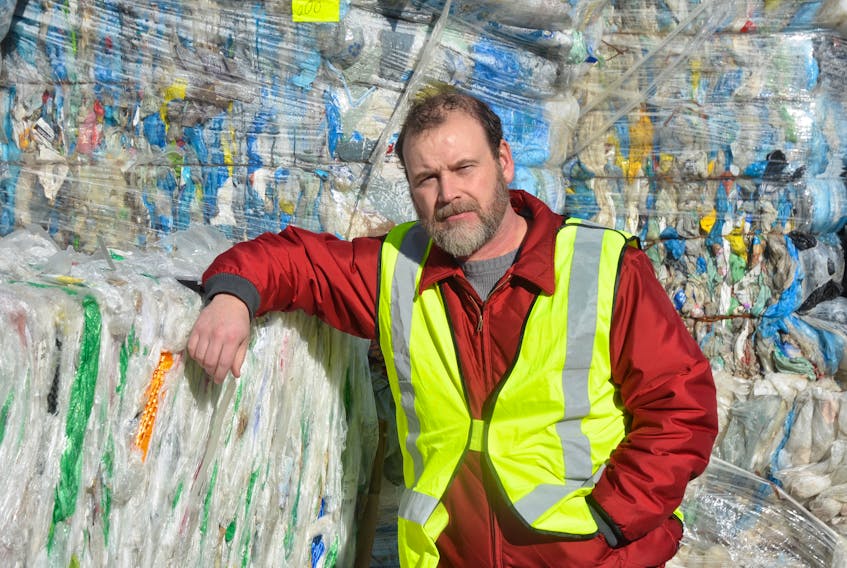KENTVILLE, NS - Valley Waste doesn’t want people to give up on recycling as the current situation with plastics is “just a bump in the road.”
With the world’s largest market for recycling plastic bags and film now saying it no longer wants the material, the mountains of stockpiled plastic continue to grow.
Valley Waste Resource Management (VWRM) communications manager Andrew Garrett said most plastics from Nova Scotia and around the world, especially plastic bags and films, have traditionally gone to China for recycling.
In July 2017, China announced that it would stop accepting 24 different types of scrap, including film plastics, by the end of the year.
Garrett said there is still some uncertainty on how long and how strictly the ban would be enforced. If China does accept plastics, the material would have to be very high quality, which is hard to get from a curbside recycling program.
“What’s happened basically is that most of the world was sending their plastics to China and now they’re trying to find other places to recycle them, so there’s a big backlog on plastics, especially plastic film,” Garrett said.
He said an added challenge in Nova Scotia is that it’s against the law for municipalities to landfill plastic bags. The Halifax Regional Municipality requested the right to landfill plastic bags and film and was granted the right to do so for six months.
Garrett said VWRM’s processor, Scotia Recycling, doesn’t want to landfill plastics and has decided to stockpile it. He said this is currently the practice at facilities in countless jurisdictions. Scotia Recycling has found other markets for small amounts of some plastics with the hope that these markets will increase once it’s demonstrated that the material is high enough quality.
Consumers can help by ensuring that they don’t recycle soiled plastic bags and by taking paper receipts out of plastic bags that they recycle. Quality does matter. Considering the abundance of plastics internationally and the law of supply and demand, small markets that continue to accept the material can afford to be picky.
Garrett said Nova Scotia has been a leader in recycling over the last 20 years, diverting everything from landfills that could be diverted. Now, people are realizing that the real problem is over consumption. He said this really came to light with the issue of plastic bags - including shopping bags and blue recycling bags - and plastic film used to package everything from produce to toilet paper.
The provincial Minister of Environment has asked municipalities if they would support a ban on plastic shopping bags. On Jan. 17, the VWRM board voted in favour of a resolution supporting a province-wide ban on single-use plastic bags, so long as the ban is part of a province-wide strategy and promotional campaign to reduce the use of all single use plastic products.
Garrett said the board is in favour of one consistent program for the entire province, as is the Retail Council of Canada. He said plastic shopping bags are an obvious item but there are many more single-use packages that could be considered.
Garrett said most retail outlets now offer the option of reusable bags and some have begun charging shoppers for plastic bags. He said stores that have instituted a five-cent fee per plastic bag have noticed that consumption has dropped by about 50 per cent. It makes people think about the issue and perhaps change their habits.
Garrett said several jurisdictions throughout North America and around the world, including China, have already banned single-use plastic shopping bags.
In the Valley region, almost 700 tonnes of plastic bags and film is recycled annually. This accounts for about half of the plastic bags and film being recycled through the Scotia Recycling facility. This means that the facility has already stockpiled hundreds of tonnes of plastic bags and film.
Plastic bags are a major source of litter and pollution on land and in the world’s oceans. Garrett said some experts project that by 2050, the weight of the plastics in the oceans will outweigh the fish.
Click here for another recent waste management story.
Click here to visit the VWRM website.
Click here to visit the VWRM Facebook page.
By the numbers
- 2,000 tonnes of material from the Valley region is landfilled annually.
- 690 metric tonnes of plastic film from the Valley region is recycled annually.
- Nova Scotians consume between 300 and 500 million plastic shopping bags annually.
- In the Valley region, people consume between 25 and 40 million plastic shopping bags annually.
- Plastic bags don’t biodegrade but fragment into small pieces and take at least 1,000 years to break down.
- A 2012 national opinion poll conducted by Angus Reid showed that Atlantic Canadians showed the highest level of support in the country for banning the distribution of single-use plastic bags by retailers. 63 per cent of respondents supported the idea.









